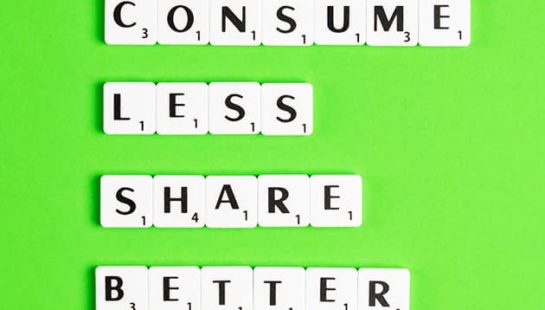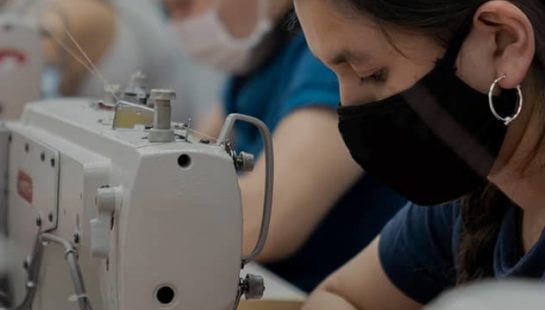Empathy And Mutual Support Needed Now More Than Ever
As the coronavirus (COVID-19) continues to play out across the globe, so too do the heartbreaking stories of poverty, hunger, and exploitation in the countries where your clothing is most commonly produced. Almost two months after the release of the COVID Fashion Commitments, a number of your favourite brands have taken a stand in supporting garment workers in their supply chains during this unprecedented time.
More than ever, it has become essential for brands, suppliers, organisations, and consumers to work together to ensure that the rights of our most vulnerable global citizens are protected. Global Business Initiative put it perfectly in saying, “Perhaps never before has collaboration, empathy, mutual support and assisting suppliers – even those far down the supply chain – been more important to ensuring lives are saved.”
During this period, Baptist World Aid is striving to provide fashion companies with as many resources as possible to assist them on this journey. Last week, we hosted our first ever COVID Fashion Commitments webinar, which brought together contacts from over 30 brands alongside a panel of expert speakers. We welcomed a highly experienced group of expert panelists to discuss these topics, who brought a depth of insight, wisdom, and knowledge to this discussion.
Collaborative Webinar To Address The COVID Fashion Commitments
Joining us were Fuzz and Carolyn Kitto, National Directors of Be Slavery Free; Matt Friedman, CEO of Mekong Club; and Kimberly Randle, Executive Director and Principal Lawyer at FairSupply. And in one jam-packed hour, the group took a deep dive into COVID Fashion Commitments 1 and 2, discussing practical strategies and real examples of actions that brands can undertake in this current, challenging climate.
But your voice is also needed to encourage clothing companies to protect the most vulnerable workers in their supply chains during the course of this pandemic. And to help you understand the ins and outs of the risks within the global fashion industry in this current context, we’re providing you with an overview of highlights from this discussion.
COVID Fashion Commitment 1: Support Workers’ Wages By Honouring Supplier Commitments
Commitment 1 asks companies to honour the purchasing commitments made to their suppliers prior to the coronavirus outbreak. Over the past few months, retail stores across the globe have been forced to shut down due to government trading restrictions, social distancing orders, and a drop in consumer demand. Many global fashion retailers have responded to this by cancelling billions of dollars’ worth of orders. The flow-on impact of these actions on garment workers has been horrendous – with millions left without wages, severance payment, or forced to work on reduced pay.
Panelist Matt Friedman stated, “There are actually three pandemics playing out simultaneously. One is the health pandemic… the second one is the economy… and the last one will be crashes in supply chains”.
He continued, noting, “What people have to understand is that a garment worker may be the sole breadwinner in a family, and a result of this is – if he or she is not working – we’re not talking about just one person being affected. We’re talking about up to five to ten people being affected. So, that’s anywhere from 5-10 million people being affected by this unemployment”.
In Bangladesh alone, an estimated $2.5 billion worth of orders have been cancelled – and this has been mirrored across a range of countries where garment production takes place. An important point to remember here is that the overwhelming majority of garment workers, even prior to coronavirus, were not making a living wage. This means that despite working up to 60-hour weeks in some cases, they were not making enough money to cover the basic costs of living, let alone put aside savings for emergency situations or potential unemployment.
So, what can fashion brands do in this complex situation? The first step is engaging in open dialogue with suppliers. Communicating the needs and circumstances of both parties is key to ensuring a human-rights based approach to business. It is important to avoid a power imbalance between brand and supplier in such conversations – rather, an empathetic negotiation is key to ensuring that negative impacts are mitigated to the greatest extent possible.
Kimberly echoed this sentiment, and reinforced the importance of these issues to not only the workers, but the business share holders as well. “Investors are increasingly concerned with supply chain transparency, so short term contract cancellations need to be balanced with long term strategies where investors in individual corporations are becoming increasingly focused on modern slavery and supply chain transparency.”
Positively, rather than cancelling many months’ worth of production and leaving garment workers without work, a number of companies have adopted innovative strategies during this time. For example, some companies are pivoting their production lines to produce in-demand textile items like face masks and other forms of personal protective equipment greatly needed around the world right now.
While it’s certainly not ‘business as usual’ at the moment, it’s encouraging to see some fashion brands working hard in creative ways to ensure that this transition time, will not come at the cost of the livelihoods of their most vulnerable workers.
COVID Fashion Commitment 2: Identify and Support the Workers at Greatest Risk
While we have all been affected by this pandemic, facing a myriad of individual challenges, it’s important to recognise that some countries and businesses are far more vulnerable – and far less equipped – to navigate the impacts than others.
For example, in Bangladesh it’s estimated that the impact of coronavirus could roll back more than a decade’s worth of gains in poverty reduction. The coronavirus crisis has not only resulted in an increased health risk, but also increased labour rights risks to all workers in the supply chain. And there is a significant overlap between vulnerable individuals who are at high risk of the virus, and those who are at high risk of exploitation of labour rights such as modern slavery.
Commitment 2 calls on companies to conduct a robust risk assessment of their supply chains and identify regions where workers are at highest risk in the context of this pandemic. After completing this assessment, companies must then implement targeted strategies to protect and support their most vulnerable workers.
One of the biggest risk contributors in this area, which quickly made itself apparent during the course of our recent webinar and panel discussion, was the overwhelming desperation currently experienced by garment workers. Their lack of income means that they may be unable to afford food or rent to feed and house their families. Matt pointed out, “That desperation results in an increase in debt. And, so, as a result of this debt… this is where the potential for modern slavery entering into supply chains takes place”. He continued, “People are not negotiating upward, they’re negotiating downward. In fact, in Bangladesh we’ve been seeing situations where people have said, I’ll work for nothing if you give me room and board”.
As a result of this desperation, children, refugees, and migrant workers are all at an increased risk of exploitation and forced labour. In desperate circumstances, parents may send their children away to work and earn what little money they can for their family. For refugees and migrant workers who are already displaced from their homes, job loss may result in difficulties retaining visas and accessing health care, amongst other challenges.
Carolyn from Be Slavery Free spoke of stories emerging from Tamil Nadu, India, where workers are being locked in factories as a form of ‘protection’. She said that although the intentions of isolating workers from coronavirus exposure were well-meaning, this was simply another hidden form of modern slavery, currently facing vulnerable workers.
The global fashion industry has certainly made huge progress in recent years in the fight against worker exploitation. However, the biggest and most urgent challenge it now faces, is to ensure that this progress is not lost a result of this global pandemic. At Baptist World Aid, we’re hoping that coronavirus will be a turning point for this industry that affects the lives of millions of people.
And as Carolyn so poignantly said, “This is a time where some of the cracks in supply chains really start to show up… It’s not that COVID has broken the supply chains or broken the methodology. The methodology was probably broken anyhow, and COVID-19 has just shattered it.”
As a consumer, your help is needed in advocating for the rights of the world’s most vulnerable workers. Find out more about the COVID Fashion Commitments here… and discover how your voice make a real difference!




 Baptist World Aid
Baptist World Aid